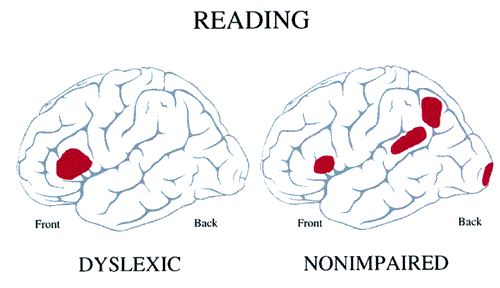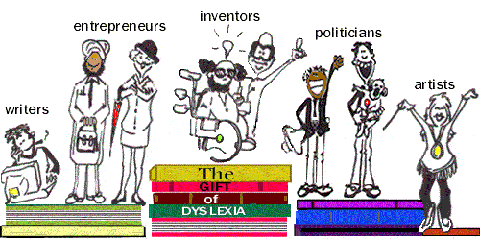Basically Dyslexia is a difficulty in word or language as a whole. It stems from the latin word dys-difficulty and -lexia, word or language.
So many times people refer to it as simply a reading problem; People who see letters backwards. Others may recognize that the pupils who have Dyslexia might show problems in writing as well. But so often, people seem to miss other important factors such as, listening difficulties (being easily distracted by other noises, low phonemic awareness etc.), spelling, time, memory, writing and motor control.
This is an image that shows where a Dyslexic person would read from as the part of their brain taking on that task and in comparison, the non-dyslexic person and the usage of their brain while reading.
As you can see in the image above, Dyslexic's read primarily from the frontal lobe area. This is a great contrast to the non-Dyslexic who gather from many different parts and the more fluent readers mainly use the back portion of their brain to read with. The Frontal portion of the brain that Dyslexic's depend on for reading is actual a visual compartment...if I can say that!? It solely works in a visual format. It will take real photographical images of the object the word is trying to portray, in order to process the written word itself. This makes it a lot more work to try and read for the Dyslexic's as opposed to the non-Dyslexic's
www.dyslexia-reading-well.com really explains this well in the video below:
This does not mean that you or your child is less intelligent...most often, on the contrary! My IQ is above average, but I have Dyslexia. So what does that mean and how does it look for my child?
Dyslexic's may not use the left side of their brain as often, but they use their right side of their brain way more! This means that you or your child will be gifted and do things better than most in areas such as: Art, Music, Design, Mechanics, Sports, etc.
www.dyslexic.org
Ron Davis believes that all dyslexics have certain talents, which are shared by many famous dyslexics who are considered to be geniuses.
- They can utilize the brain's ability to alter and create perceptions (the primary ability).
- They are highly aware of the environment.
- They are more curious than average.
- They think mainly in pictures instead of words.
- They are highly intuitive and insightful.
- They think and perceive multi-dimensionally (using all the senses).
- They can experience thought as reality.
- They have vivid imaginations.
Read more:http://www.dyslexia.com/qagift.htm#980831#ixzz2ol1yUKRx
Well, Dyslexia is hereditary and the ratio of those who have it in the US alone, is 1 out of 5 people. That is a lot. Here are some things you may or may not notice right away:
- Reading and Spelling Difficulties
- Handwriting issues
- Quality of Written Work
- Directionality issues
- Sequencing steps in a task
- Rote memory of non-meaningful facts
- Telling Time on a clock with hands
- Math difficulties
- Organizational skills
No child or person is alike, so please bear that in mind, as well as, Dyslexia comes in mild, middle and extreme! If you are wondering if this could be you or your child, please see Susan Barton's Videos Here
Getting Help:
Here you will find a list of great programs to help assist you as well as check out my page of Curriculum Choices, which I compiled through experience and Teacher's advice!!!
Scroll down to the "GETTING HELP" part of this page to find helpful resources for finding someone in Canada who does testing if you wish to further that interest.
If you have any questions, please feel free to leave them and I will do my best to help with them too :D
What is Dysgraphia?
Wikipedia writes,
"Dysgraphia is a deficiency in the ability to write, primarily in terms of handwriting, but also in terms of coherence.[1] Dysgraphia is a transcription disability, meaning that it is a writing disorder associated with impaired handwriting, orthographic coding (orthography, the storing process of written words and processing the letters in those words), and finger sequencing (the movement of muscles required to write)....
The word dysgraphia comes from the Greek words dys meaning "impaired" and graphia meaning "writing by hand".
People with dysgraphia can often write on some level and may experience difficulty with other fine motor skills, such as tying shoes. However, dysgraphia does not affect all fine motor skills. People with dysgraphia often have unusual difficulty with handwriting and spelling[2] which in turn can cause writing fatigue.[3] They may lack basic grammar and spelling skills (for example, having difficulties with the letters p, q, b, and d), and often will write the wrong word when trying to formulate their thoughts on paper."
NCLD says,
"Dysgraphia is a learning disability that affects writing, which requires a complex set of motor and information processing skills. It can lead to problems with spelling, poor handwriting and putting thoughts on paper. People with dysgraphia might have trouble organizing letters, numbers and words on a line or page."
|
Here is a Video that helps with Understanding Dysgraphia and practical solutions:
OK, it looks like my child probably has Dysgraphia...Now what?!
I have notice that some families are opting out of being under a 'School' in particular. So, if that is you and you are only Registered with a School or are completely Un-Schooling, this may be a harder process. One that involves little outside help. You may be required to pay for the full funding of things etc. Pray and keep seeking. Being independent can have its blessings too! Scroll down to the assessment links and there you can find some helpful information.
However, if you are Enrolled in a School through Homeschooling, the process is much easier. There are usually fewer students and more one-on-one help from Support Teachers. There still might be a few bumps...but not as much as some families I know that are in the Public System. In the Public Schooling sector, you may find it to be a very daunting task with hurdles and people to go through. Never fear though, just pray and God will help direct your path!
Once Dysgraphia or Dyslexia is in question. The next step would be to talk with your Support Teacher or Class Teacher. It is their duty to help assist and/or find Learning Difficulties in your child and to help the Parent in her support through that process. They may have helpful resources for you in recognizing Dysgraphia, or may have already started the process through observations. The key here is COMMUNICATION :)
There is Tutors that can help (I will give links to those in a post later this week) and she/he may refer you to them. The school may have some in place and be able to implement that help right away. They may have helpful tips or tools in the classroom ready for those situations (Eg. pencils that are in different shapes, grippy's for the pencil etc.) then there is the testing too! They may ask you to do an online assessment.
After the above issues are played out, the next step is Professional Assessments. Often times, the parent has to pay for some, or all, of the testing. Some schools may have funds to assist and you should ask if that is the case! It never hurts to ask, my husband always says :D
GETTING HELP!
- Canadian Dyslexia Centre runs about $500 + tax
- Dyslexia Hamilton runs about $325 + tax
- The Open Door
- Behavior and Learning
- *Ed/Psych testing strongly recommended (will reveal learning challenges)(Cost is ~$3000, however, Extended Health may cover most of the cost. Check to see what your health plan will cover.)
- This is just an Awesome Information link for Canada and US
British Columbia branch of the International Dyslexia Association 604-274-7836
Private School Assessments:
Frazier Academy, Vancouver, BC 604-736-5575
Kenneth Gordon Maplewood School, North Vancouver, BC 604-985-5224
Learning Difficulties Centre, Prince George, BC 250-564-8011
Below is a link to a helpful Video that directs you to help that is rightfully yours in the School System for those in the US.
Learning Difficulties will always be a challenge.
But that is just it....Challenges are meant to be Overcome!
I think the most crucial thing for us as Homeschooling parents is to understand how our children learn and respond to the education we are providing them.
For some of us this is the basis as to why we even started Homeschooling in the first place, others for drastically different reasons, and then through the process of Homeschooling came to the same road blocks unintentionally.
Some of our children struggled with how they processed information and were falling behind in the standard square-boxed educational system. Yet, some of those same children are bright and often very advanced in many other areas. These issues and many others including a definite calling of God to this task, is why we began the journey of Homeschooling for our children.
In light of all of that, we get discouraged and hit road blocks that seem impossible to climb over if we do not understand how these precious children process the information we are attempting to provide for them.
When it comes to Dyslexia in particular, it is really hard for those who are not Dyslexic to grasp how the person who has Dyslexia thinks. It is also very important for those with Dyslexia to understand how they think and ways to work with their thought processing for the written word.
Many times it also is in degrees for each child who is Dyslexic. For example, one may have strong Dysgraphia and auditorial discriminational problems, while another may have a hard time getting thoughts down in sequence and understanding vocabulary, letter positioning, or spelling, etc.
It is so important to understand where your child struggles and get the proper resources to help them understand and succeed.
In the Simulations below you will see how Un-Dyslexic participants feel after they do tasks similar to what a Dyslexic might be feeling. I have to admit it was so nice to see someone feeling and experiencing some of things that I personally experienced in school. I was the best disguiser and just hid in class to avoid many of these things. What an eye-opener this is!
This next very informative video, describes well how we use thoughts very differently from the non-dyslexic populous.
These two video's describe how someone with a DL processes auditorial and positional information for the written word.
Getting all of this great information can really help in our preparation for Homeschooling. It can help us to individualize our child's needs and help to find the accommodations they need for them to succeed and be everything that God has created them to be!
Embrace their Innovations, Imagination, Athletic Abilities, Machinery Mechanisms they love to do, Building Projects, Aspirations, Drawings, Space Explorations, Business Adventures and of course their LOVE of learning.
Let them experience this amazing world through the mind of a Dyslexic and watch them do extremely well!
And of course....
Happy Learning :D








No comments:
Post a Comment